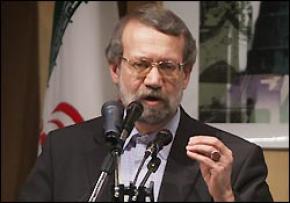ID :
99091
Sun, 01/10/2010 - 00:29
Auther :
Shortlink :
http://m.oananews.org//node/99091
The shortlink copeid
Everyone with differing views is not a dissident: Iran's Majlis speaker

TEHRAN, Jan. 9 (MNA) -- Majlis Speaker Ali Larijani has criticized the people who made derogatory remarks about Mohsen Rezaii in regard to his recent letter to the Supreme Leader about Mir-Hossein Mousavi’s recent proposals.
Larijani made the remarks at a meeting with national police chiefs in Qom on Thursday.
“Rezaii has been a real mujahid (one who struggles in the cause of Islam) and strived wholeheartedly during the (1980-1988) Iran-Iraq war. Naturally, since he has entered the political scene, some of his ideas may be criticized. But why do some political figures question his career as a mujahid?”
“Today, society needs convergence not discord and not steps meant to undermine recognized figures’ positions,” he added.
Former presidential candidate Mir-Hossein Mousavi issued a statement on January 1 in which he made five proposals for resolving the current issues facing the country. Then, on the same day, Expediency Council Secretary Mohsen Rezaii sent a letter to Supreme Leader of the Islamic Revolution Ayatollah Seyyed Ali Khamenei in which he described the proposals as noteworthy.
Political figures expressed diverse views on the letter, and some of them harshly criticized Rezaii’s remarks.
“We should not call anyone who has different views a dissident and a hypocrite. In line with the Supreme Leader’s directives, all people should try to create unity in the country to prepare the ground for economic activities, investment, and development,” the Majlis speaker said.
Pointing to the criteria for an efficient police department, he highlighted the role of religious faith and a sense of commitment among police officers and said the power of the police is not only dependent on their equipment and intelligence gathering capabilities.
“Police forces should be able to make political and social analyses to be able to maintain security across the country,” he stated.
He also stressed the importance of devising a code of professional conduct for the police based on the tenets of Islam, saying that since the police directly deal with the people, they should uphold the principles of firmness, restraint, and Islamic ethics while performing their duties.
Elsewhere in his remarks, he said that the Islamic Revolution stands on the pillars of Islam, democracy, national unity, justice, and the struggle against oppression.
Larijani made the remarks at a meeting with national police chiefs in Qom on Thursday.
“Rezaii has been a real mujahid (one who struggles in the cause of Islam) and strived wholeheartedly during the (1980-1988) Iran-Iraq war. Naturally, since he has entered the political scene, some of his ideas may be criticized. But why do some political figures question his career as a mujahid?”
“Today, society needs convergence not discord and not steps meant to undermine recognized figures’ positions,” he added.
Former presidential candidate Mir-Hossein Mousavi issued a statement on January 1 in which he made five proposals for resolving the current issues facing the country. Then, on the same day, Expediency Council Secretary Mohsen Rezaii sent a letter to Supreme Leader of the Islamic Revolution Ayatollah Seyyed Ali Khamenei in which he described the proposals as noteworthy.
Political figures expressed diverse views on the letter, and some of them harshly criticized Rezaii’s remarks.
“We should not call anyone who has different views a dissident and a hypocrite. In line with the Supreme Leader’s directives, all people should try to create unity in the country to prepare the ground for economic activities, investment, and development,” the Majlis speaker said.
Pointing to the criteria for an efficient police department, he highlighted the role of religious faith and a sense of commitment among police officers and said the power of the police is not only dependent on their equipment and intelligence gathering capabilities.
“Police forces should be able to make political and social analyses to be able to maintain security across the country,” he stated.
He also stressed the importance of devising a code of professional conduct for the police based on the tenets of Islam, saying that since the police directly deal with the people, they should uphold the principles of firmness, restraint, and Islamic ethics while performing their duties.
Elsewhere in his remarks, he said that the Islamic Revolution stands on the pillars of Islam, democracy, national unity, justice, and the struggle against oppression.





